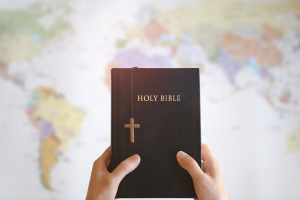'But I was born this way': Please hear me out on this LGBT argument
Today I received messages from two separate friends that said essentially the same thing:
“Kaeley, check out this post from my Christian relative. He’s using his ministry platform to endorse LGBTQ ideology, and he’s saying God approves of it. How can he read the Bible and come to these conclusions? How can he justify leading people astray this way?”
And of course, the short answer is that he can’t. Christianity is completely and utterly incompatible with this ideology, which basically says, “God, I don’t care what you say is best for me or what rules you’ve issued to assure my health and well-being in this world. What matters most is what I feel. I’m gonna do it my way.”
But these are not easy conversations to have, especially with people we know and love. I know I personally dread them. For one thing, my own sexual history is as sordid as the day is long. I’m not exactly a contender for any claim to moral high ground where sexual ethics are concerned. I’m certainly no better than anyone on the receiving end of my opinions about the Christian view of sex.
For another thing, I know and love a lot of gay and lesbian people, and quite frankly, I enjoy them more as humans than a lot of Christians I know. I generally tend to believe that if they want my opinion about their sexual choices, they will ask for it. Otherwise, I’m mostly content to just allow our friendships to revolve around any number of the litany of other shared interests we may have between us.
One of my lesbian friends sends me cookbooks because I suck in the kitchen, and she’s trying to help me improve. Another has the best meme collection on the internet. Some of my lesbian friends have been the fiercest, bravest advocates for the preservation of women’s sex-based protections. They’ve had my back when a number of people who called themselves Christians would not. A gay guy I know is a rockstar karaoke performer, and, as anyone who knows me will tell you, good karaoke is one of my primary love languages. It’s amazing what kind of relationships can form when you don’t reduce peoples’ very essence to their choices behind closed doors. We are all a lot more than this isolated portion of ourselves.
Still, whenever June comes around and the rainbows and parades emerge in every major city, including conservative Coeur d’ Alene, there’s an unwritten sort of peer pressure to virtue signal your support for the movement, as though your silence marks you as some sort of regressive hateful bigot on par with the Ku Klux Klan, and many of us in the portions of the Church that have not abandoned biblical principles just bite our tongues and pray for July to come quickly.
To be fair, Pride today is a much different critter than it used to be. Most of the lesbians I know won’t even touch it with a 10-foot pole because it’s become little more than a public display of men’s sexual fetish as cheered by attention-seeking moms who are willing to prematurely sexualize their children by dragging them to parades with naked men on dog leashes so that they can broadcast how very empathetic and inclusive they are all over social media. Blech.
No, sisters, letting your littles watch sex clowns twerk in G-strings on a stage does not make you a nice and loving person; it makes you a crappy parent. Give your head a good shake and stop using your children as props for your own identity restoration campaign.
Modern day Pride is a nightmare, and I don’t have any reservations about saying so. Just Google the photos from any local Pride parade, and you’ll see what I mean; Christians, especially, ought to have nothing to do with it. This isn’t hard to understand.
But if I’m honest, writing off Pride as a big old fetish fest, while accurate, is a bit of a cop-out for people like me. Because if you really pressed me and asked me, “Would you celebrate Pride if it didn’t involve leather and ball gags, if it only celebrated the legalization of gay marriage, would you?”, the answer I would have to give you is no.
And if I really had to explain this, it’s because I don’t think of marriage as a legal transaction. While there is a debate to be had about the government’s role in marriage (I personally think it should be limited with a few caveats that protect children’s inherent rights to both their mother and their father), the truth is that the word means vastly different things to the secular world than it does to the religious world. I think of marriage as a holy sacrament, a covenant with God, for which He has provided clear standards, one of which is that it’s only designed to occur between a man and a woman. (See brief video by Ben Witherington for a breakdown of the biblical basis for my position. It’s a lot to type in the span of a single blog.) This is created order, and it’s made pretty clear from the very first book and chapter of the Bible.
Now before anyone rips my head off, I also want to make it very clear that I ultimately believe in freedom. I oppose the barbaric, draconian penalties imposed on gay people in early America. I think it’s horrific that we used to chemically castrate gay men like Alan Turing. (Don’t get me started on the fact that the trans lobby is using these same exact drugs to chemically castrate gender non-conforming boys.) Inexcusable. And incarcerating gay people? Just no. Not okay.
While I wouldn’t call it marriage, if someone decides they want to shack up with a member of the same sex for the rest of their lives, of course they should be legally permitted to do so. And I think all humans should have the right to decide who gets to legally represent their next of kin or be present in the hospital when they’re ill or dying. These are all freedoms I enthusiastically support for all people regardless of what they believe about marriage or sex.
People ought to be treated with dignity. Period. And I think a lot of Christians feel this way, which is why we are so often inclined to remain silent on these topics as much as possible.
But it’s one thing for the secular world to believe whatever they believe. It’s another thing entirely for people who claim to represent God to claim that He endorses something He clearly condemns.
And that’s when our silence begins to feel a bit more like complicity.
Because God does condemn homosexuality in pretty clear terms, just like He condemns all extramarital sex in pretty clear terms. See Romans 1. There’s no circumventing this. It’s not because He’s some cosmic killjoy. It’s because, as the One who designed humanity, He has the ultimate say in how He thinks we ought to function, and when we deviate from those standards, we do so at our own expense.
As my friend Brian F. Marks brilliantly put it, “The physical body as male and female has inherent moral meaning that Christians are obligated to respect. The very structures of our sexually dimorphic anatomy correspond to the other and that it’s intentionally designed that way. In other words, the way God made us is no accident and homosexuality, like other sexual sin, distorts it.”
“But I was born this way,” some may argue. And please hear me when I say that I absolutely believe you. I’m sorry that so many do not. I 100% believe that all humans are born with innate proclivities toward things that are not great for us. For me, it’s stubbornness and pride. For others, it may be overeating. The question is what we do with these proclivities that seem so hardwired into our genetic code that we feel almost powerless to overcome them. Do we surrender them to Jesus or not? And what does that even mean? I mean, I’ve asked Him to help me with my own flaws about a trillion times, and here I am still struggling.
These are complicated issues that require compassion and process and time and a severe amount of wrestling, and some of us don’t ever fully master the struggle this side of Heaven. But the point is that the Christian ethic says we need to at least try. We don’t have the luxury of saying, “This is just how I am” if God says we need to change.
Jesus says, “come as you are,” not “stay as you are.” He says, “Go and sin no more,” and that’s the hardest part for most of us to contend with. Because the Christian life is all about surrender. And it’s very painful and hard a lot of the time. We are supposed to transform ourselves into His image, not the other way around. And when we call on Him for help, He never leaves us alone. He sees our struggle. He knows our pain. And I do think we Christians could often dramatically improve the way we communicate all this, unpopular as it may be.
It wouldn’t do much good to march up to an obese person and scream, “Repent, glutton! Turn or burn!” or hold up picket signs reading “God hates fat people.”
Unfortunately, that’s basically what too many in the Church have done to gay people, and it’s awful.
If you want to help someone who’s struggling with weight issues, you need to understand where they come from, what trauma they’ve endured, what emotional wounds they’re trying to ease with food, what chemical imbalances they may suffer, how they respond to shame, and how you can speak life and dignity into them where they are.
From a Christian perspective, it’s similar to same-sex attraction. People are actually physically attracted to the same sex. This isn’t something they just woke up and chose to feel one day. Telling them to just snap their fingers and change is both ignorant and unhelpful. It would be like someone telling you to just learn to breathe a different way. It’s not that easy. And in this context, what we are inviting them to (often lifetime celibacy) is unspeakably lonely. Anecdotally, a high percentage of the gay and lesbian people I know are also people who’ve experienced some pretty significant sexual trauma. This ought to flood us with compassion for their struggle, not self-righteousness that we weren’t dealt a hand of cards this difficult to play.
Like I said, I hate even having to talk about this. If there’s one topic with which I’ve struggled fiercely to reconcile with God’s goodness, it’s this one. It doesn’t seem fair. But I can’t bend and twist the Scripture to say what I want it to say. I have to take God at His word and trust that His ways are ultimately better than my limited understanding of the bigger picture.
The Bible warns against Christians who are willing to compromise biblical truth in order to gain favor with people.
2 Timothy 4:3-4 says, “For a time is coming when people will no longer listen to sound and wholesome teaching. They will follow their own desires and will look for teachers who will tell them whatever their itching ears want to hear.”
I wouldn’t be worth following if I were willing to say what people want to hear just to keep their subscriptions. And if God says this road leads to Hell, then I have NO business cheerleading people as they walk it — not if I actually care about them.
I’m reminded of a video I watched where Penn Jilette talked about a fan who gave him the gift of a Bible and risked starting a conversation with him about God. It’s a video that’s stayed with me through the years. In it, Penn acknowledges that, while he remains unconvinced of the existence of God, he was deeply moved by the fan’s choice to risk that conversation. “How much do you have to hate someone,” he asked, “to believe that people could be going to Hell and not proselytize?”
Penn didn’t ultimately agree with the fan, but he saw his heart. He could discern that the choice to risk disagreement and the ruffling of feathers was born of love, that it wasn’t self-righteousness but genuine concern that prompted him to brave the social awkwardness of a difficult discussion. And that was infinitely more loving to him than an endorsement of his belief system could ever be.
As I write this, I do so with a sense of dread that a number of the people reading, for whom I have genuine affection, may possibly cut ties and write me off as a disappointment or a bigot. But that’s ultimately God’s business. The Bible says that “to those who are perishing, we are a dreadful smell of death and doom. But to those who are being saved, we are a life-giving perfume.” Some people will not have the stomach to tolerate what I’ve written here, and I wish them nothing but blessing and peace regardless.
I wouldn’t have said anything at all if it weren’t for the scores of churches publicly making statements that I believe lead people straight off a cliff. They may get to feel warm and fuzzy and inclusive, but is that what love actually requires? How much do you have to hate people to believe that they’re headed toward hell and not issue at least a word of warning?
So no, I won’t be celebrating Pride. But I’m always down to celebrate people, even the ones who disagree with me. Jesus died because He desires that all should be saved, even the ones who struggle differently than I do.
Kaeley Harms, co-founder of Hands Across the Aisle Women’s Coalition, is a Christian feminist who rarely fits into boxes. She is a truth teller, envelope pusher, Jesus follower, abuse survivor, writer, wife, mom, and lover of words aptly spoken.



























